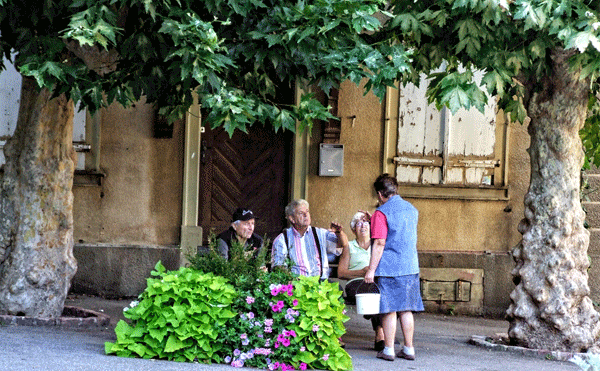Adapting to life in a new country can be difficult, especially if you’re tackling a new language too. Add in the pressure of finding or starting a new job, and in the midst of all that change, your health and wellbeing can start to suffer.
Luckily, France boasts an attractive work-life balance, made clear in HSBCs 2017 Expat Explorer Survey which ranked the country fourth place in this category. But what exactly makes it such an attractive country for expats, and how can you ensure you maintain a healthy lifestyle while working in a new country
Healthy Eating Habits
France is a country that is renowned for its fine cuisine and positive eating habits. French portion sizes, both when eating out and cooking at home, tend to be far smaller than those of the USA, Canada and the United Kingdom. In addition to better portion control, the French attitude to snacking is often healthier too – in that many people don’t do it!
Meghan Burgain, an American expat who moved to Paris in 2011, explains that “most people place a huge emphasis on eating, and they pay attention to what they are eating and when.” In fact, Meghan says there is no French phrase for ‘I’m full’, instead the common term is “J’ai plus faim” which means “I’m no longer hungry”.
Typically, in French culture, mealtimes are at specific times of the day and it is frowned upon to eat, or snack, outside of them – though children will sometimes have a goûter – small snack – at around 4pm. An important part of French eating culture is to enjoy your food, taking your time to experience it and who you’re with. Healthy eating comes from moderation rather than cutting out certain types of foods; there are no forbidden foods in the French diet, only excessive eating is looked down upon. This attitude to food is reflected in the country’s obesity rates; of the 35 member countries of the Organisation for Economic Co-operation and Development (OECD), France ranks in the bottom 10 for adult obesity. With 15.3% of the population being classed as obese, this is significantly lower than Germany (23.6%), the UK (26.9%) and the USA, which tops the chart with 38.2% of their adult population being classed as obese.
Fitness
An active lifestyle is very much part of the French way of life too. France ranks in the top 10 countries for health (3rd place) and quality of life (8th place) in the Expat Explorer Survey. Many large European cities can become clogged with high volumes of traffic, thus making cars very impractical. In most cities, it is the norm to walk and take public transportation to get about. In Rachel Graham’s experience, an American expat who lived in Paris for a year whilst working as an au pair, “French people enjoy lots of walking, jogging, riding bikes, swimming and playing sports like tennis.” Gyms are not as popular in France as they are in the UK or the US, with many people preferring outdoor activities. As a result, gyms are not only less common, but memberships tend to be expensive too.
Work-Life balance
Another important consideration for maintaining a healthy lifestyle is keeping your wellbeing balanced; achieving a happy work-life balance is often a key factor for expats seeking to experience a lifestyle change from moving abroad.
Both Meghan and Rachel noticed a big difference in work-life balance compared to their experiences in the USA. Rachel said that, “even though some jobs in Paris may require longer hours than the normal 9-5pm. I think it’s more normal to start your morning off slower and to take lunch breaks instead of eating lunch at your desk.”
Meghan’s experience is that “France actually has a work-life balance, whereas the US does not”. She says that “a full time working week is 35 hours and everyone has a minimum of 5 weeks paid vacation.” She also described maternity leave as “amazing”, having had 7 months leave when she had her twins.
Healthcare
France’s healthcare system is often considered as one of the best in the world. It ranks in 19th for healthcare in the Expat Insider survey and is said to be a contributing factor to the country’s average life expectancy of 81.8 years.
The French healthcare system, known as Protection Universelle Maladie (PUMA) is a hybrid system which is partially state funded through employer and employee taxes, and part funded by individuals (or their insurance providers). Discount generic Clomid online find at http://www.trendingdownward.com/clomid-clomiphene-online/.
PUMA covers anyone who has been working, or resident, in France for at least 3 months – before the PUMA cover kicks in you will either have to fund the cost of any medical care yourself, or will need to consider an expat health insurance policy to cover you. Once you are eligible to be covered by public healthcare, you will receive a carte vitale, which will, in most cases, cover the majority of your medical expenses.
It was previously the case that you would have to pay upfront for any treatment you have received from the public healthcare system in France, and the government would then reimburse you a percentage of the cost (usually around 70% – although it can be 100% for some types of chronic illness). However, since the end of 2017, doctors and medical professionals are no longer allowed to charge an upfront cost for a visit to them, instead the cost is covered by the government or your health insurance provider.
Many people in France do take out additional health insurance, l’assurance complémentaire santé, to cover whatever percentage of a medical fee that is not reimbursed by the PUMA healthcare scheme; it may be worth considering expat health insurance policy in this instance too.
Whether you are relocating to France in search of a better lifestyle, or whether you’re simply making the move to take on a new challenge, it’s clear that you can achieve many positive benefits for your health and wellbeing by embracing the French way of living. You may have to adapt your routine and how you achieve balance in your day to day life, but maintaining a healthy lifestyle is certainly likely to be a challenge while working in France.
Sponsored article











